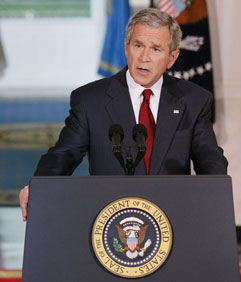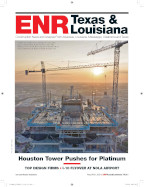After vetoing a defense spending bill that would set a timetable for withdrawing troops from Iraq, President Bush told an audience of construction industry officials that the success of the military strategy there is critical to protecting the U.S. from terrorist attacks and needs more time to show results.
 Eric Draper Bush announces veto of $124-billion spending measure. |
In a May 2 speech before the Associated General Contractors’ annual national and chapter leadership conference in Washington, Bush touched on domestic issues, such as the need to make tax cuts permanent and calling for comprehensive immigration legislation “without amnesty and without animosity.” But most of his address was a forceful statement of his views on the need to “keep the pressure on” militarily in Iraq.
He said, “For America, the decision we face in Iraq is not whether we ought to take sides in a civil war. It’s whether we stay in the fight against the same international terrorist network that attacked us on 9/11.”
Bush said that the Iraq conflict is “a tough fight” and acknowledged that the previous U.S. strategy “wasn’t working the way we wanted it to work.” He said the revised plan is in its “early stages,” and that” new commander Gen. David Petraeus should be given “time to see whether or not this works.” Bush said he would be able to report on the results “by the end of the summer.”
The previous evening, Bush vetoed a $124-billion supplemental spending bill that focuses mostly on Iraq war funding, because he objects to a provision setting a timetable for withdrawing U.S. troops from that country. In his AGC speech, Bush said of the timetable, “That didn’t make any sense to me, to impose the will of politicians over the recommendations of our military commanders in the field. So I vetoed the bill,” which drew applause from the audience.
The measure also has up to $9 billion for military and civil construction, plus $4.8 billion in tax breaks for small businesses. In announcing his veto, Bush said that “the bill is loaded with billions of dollars in non-emergency spending that has nothing to do with fighting the war on terror. Congress should debate these spending measures on their own merits—and not as part of an emergency funding bill for our troops.”
An industry source expects at least some of the bill’s non-defense spending to survive, including money to continue strengthening the flood control system around New Orleans and some of the aid it provides for the Dept. of Veterans Affairs.
After Bush vetoed the legislation, Senate Majority Leader Harry Reid (D-Nev.) said that “we will continue to reach out to the President” but added that “if the President thinks that by vetoing this bill, he will stop us from working to change the direction of this war, he is mistaken.”
The House on May 2 failed to override Bush’s veto. The vote was 222-203, which was far short of the two-thirds majority needed to overturn the President’s action. Bush also met with congressional leaders to discuss the next steps for the spending bill.

